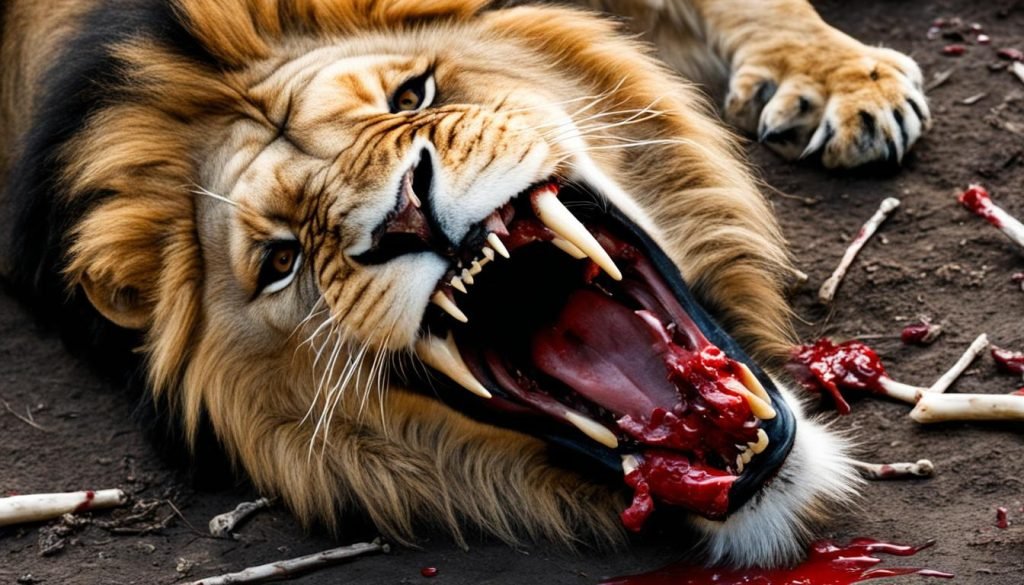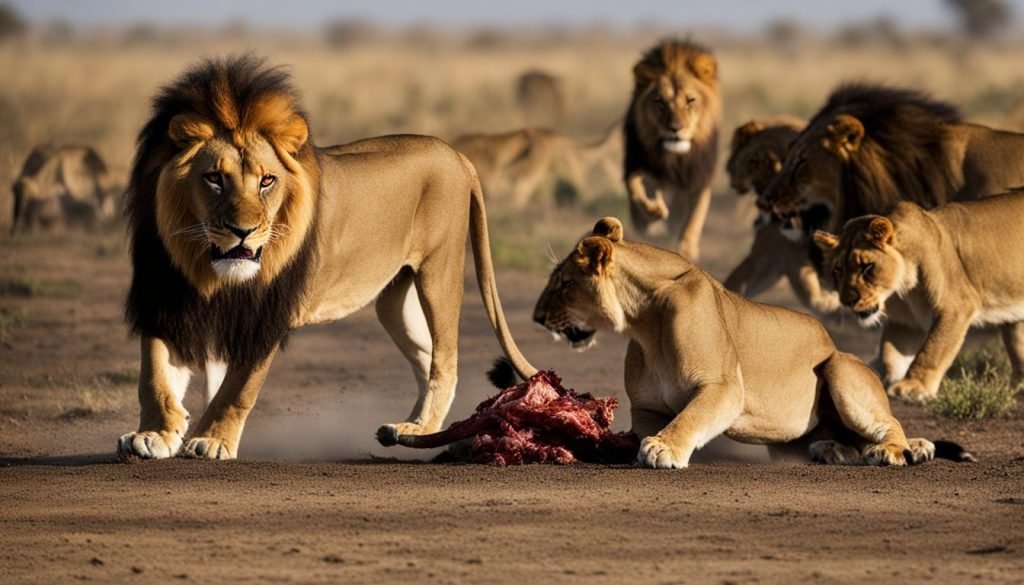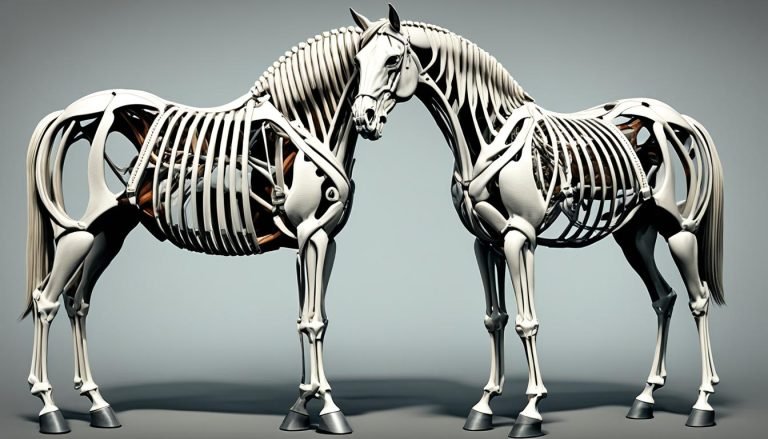Cannibalism in Lions: Do Lions Eat Other Lions?
Lions are often perceived as majestic and powerful predators, roaming the African savanna in search of prey. But, do lions eat other lions?
This is a question that has intrigued scientists and wildlife enthusiasts for decades. The answer is not as straightforward as one might think, but the short answer is yes, lions do eat other lions under certain circumstances.
To understand why lions engage in cannibalistic behavior, it is necessary to explore their diet and feeding habits, their position in the food chain, and their behavior as predators. With this in mind, let’s take a closer look at the complex nature of lion cannibalism and its implications.
Key Takeaways:
- Lions do engage in cannibalistic behavior under specific circumstances.
- Understanding lion diet and feeding habits is crucial to understanding their behavior.
- Lions occupy a unique position in the food chain as apex predators.
- The complex nature of lion behavior requires a holistic approach to conservation and management.
- Cannibalism in lions is one aspect of their predatory behavior that still eludes complete understanding.
Lion Diet and Feeding Habits

Lions are carnivorous and their diets consist primarily of meat. As apex predators, they have a wide range of potential prey, including antelopes, zebras, buffalo, and even elephants in some cases. However, their preferred prey species varies depending on factors such as location, season, and availability of resources.
Unlike other carnivores that may feed opportunistically, lions are obligate predators and need to consume large amounts of meat regularly to survive. Depending on the size of the pride and the amount of prey available, a lion may consume anywhere from 5 to 15 pounds of meat per day.
When hunting, lions rely on a combination of stealth, strategy, and brute force to take down their prey. They usually hunt in groups, with females doing most of the hunting while males protect their pride from competitors and other threats. Lions may employ a variety of hunting techniques depending on the prey species and the terrain in which they are hunting.
One common hunting strategy involves stalking prey from downwind to avoid detection, followed by a coordinated attack that typically involves one or two lions going for the throat and another going for the belly. Once the prey is down, the lions will gorge themselves on the meat until they are satiated, often leaving the remains for scavengers such as hyenas and vultures.
The Concept of Cannibalism in Lions
Cannibalism refers to the act of one individual of a particular species feeding on another individual of the same species. While this behavior seems unusual and even gruesome to humans, it is quite common in the animal kingdom, and lions are no exception.
As top predators, lions typically prey on a variety of animals, including antelopes, wildebeests, zebras, and even small mammals. However, under certain circumstances, lions may resort to cannibalism and feed on other lions.
Research suggests that cannibalism in lions is often associated with territorial disputes, where a male lion may kill and eat cubs from a rival male to establish dominance and increase his reproductive success. Other factors that may contribute to lion cannibalism include scarcity of prey, competition, and social dynamics within lion prides.
It is important to note that cannibalism is not a common behavior in lions and is only observed under specific circumstances.
“Lions are complex and fascinating creatures, and their behavior often reflects the intricacies and challenges of living in the wild. Cannibalism may seem shocking, but it is just another example of the adaptability and flexibility that makes these majestic animals so successful.”
Do Lions Eat Other Lions? Instances of Lion Cannibalism

While lions are generally known to prey on a wide variety of animals, including zebras, gazelles, and wildebeests, they have also been observed to exhibit cannibalistic behavior in certain circumstances. Documented cases of lion cannibalism provide insight into the predator-prey relationships within lion communities and the complexities of their social dynamics.
One well-documented case of lion cannibalism occurred in Tanzania’s Ngorongoro Crater in 2004 when a male lion was observed killing and consuming two of his cubs. This event was particularly unusual as male lions are not typically involved in cub-rearing activities. However, researchers later discovered that the male lion was not the biological father of the cubs and likely killed them to expedite the female’s reproductive cycle.
Another instance of lion cannibalism was recorded in 2015 in Zambia’s Luangwa Valley. In this case, a lioness was found feeding on a member of her pride who had recently died. While scavenging on the remains of deceased pride members is not uncommon among lions, actively consuming a living member is a rare occurrence.
Documented Cases of Lion Cannibalism
| Location | Date | Description |
|---|---|---|
| Ngorongoro Crater, Tanzania | 2004 | A male lion kills and consumes two cubs not his own |
| Luangwa Valley, Zambia | 2015 | Lioness feeds on a living member of her pride |
The reasons for lion cannibalism are not fully understood, but it is often attributed to factors such as territorial disputes, competition for resources, and scarcity of prey. In certain cases, it may also be linked to social dynamics within lion prides, such as the need to establish dominance or eliminate rival members.
However, it is important to note that while lion cannibalism may seem brutal and harsh, it plays a significant role in shaping the evolutionary landscape of lion populations. Natural selection favors those lions who are best adapted to compete and survive in their environment, and cannibalism may contribute to this by promoting the spread of favorable genetic traits and eliminating weaker competitors.
Reasons for Lion Cannibalism

While cannibalism is not a common feature of lion behavior, certain factors can lead to lions resorting to this extreme measure. One of the primary reasons is the scarcity of prey. In environments where food is scarce, lions may turn to cannibalism as a means of sustenance.
Competition and territorial disputes can also play a role in lion cannibalism. In situations where multiple lions are vying for the same resources, such as water or grazing lands, cannibalism may occur as a way to eliminate rival lions and secure access to vital resources.
Social dynamics within lion prides can also contribute to cannibalistic behavior. When a new male lion takes over a pride, he may kill the cubs sired by previous males as a means of asserting dominance and securing his genetic legacy. This infanticide can also be considered a form of cannibalism.
Overall, lion cannibalism is a rare behavior that occurs under specific circumstances. While it may seem violent and brutal to human observers, it is simply another aspect of the complex predator-prey relationships that exist in the natural world.
The Role of Scavenging in Lion Cannibalism

Lion cannibalism is not limited to predation; scavenging also plays a role in the consumption of deceased lions. Scavenging is often the primary way in which lion cannibalism occurs. Lions are opportunistic hunters, and scavenging allows them to utilize any available food sources, including their kind.
Scavenging on lion carcasses can occur within a pride or between prides. It is not uncommon for lions to feed on the remains of deceased pride members, including cubs, adults, and sub-adults. As a result, scavenging can be considered a form of cannibalism.
Moreover, lions may occasionally scavenge on individuals from rival prides. Scavenging on rivals may be related to territorial disputes and aggressive behavior toward competing prides. In rare instances, this can lead to confrontations between prides, resulting in deaths and subsequent scavenging.
Despite the macabre nature of scavenging on one’s kind, it is a necessary means of survival in lion populations. While it may seem brutal to humans, lion cannibalism is a natural aspect of their hunting and feeding behavior. By scavenging and consuming deceased lions, they can maintain their status as apex predators in their environments.
Implications for Lion Conservation
Lion cannibalism is a complex behavior that has significant implications for conservation efforts. While it is not a common occurrence, instances of lion cannibalism can have an impact on lion population growth. The act of killing and eating other lions can remove potentially breeding individuals from the population, reducing genetic diversity and potentially leading to inbreeding depression. Additionally, cannibalism can disrupt pride dynamics and destabilize social structures, leading to increased aggression and infighting.
Therefore, conservationists must understand and manage predator-prey relationships in lion habitats. This includes efforts to ensure an adequate prey base for lions and to manage human-lion conflicts, as well as conservation strategies aimed at promoting social stability within lion prides. By effectively managing these issues, conservationists can help to ensure the long-term survival of lion populations and minimize the occurrence of cannibalistic behavior.
Comparative occurrences of lion cannibalism
| Location | Time Period | No. of Observed Cases | Main Causes |
|---|---|---|---|
| Mara-Serengeti, Tanzania and Kenya | 1960s – Present | 32 | Scavenging, territorial disputes, scarcity of prey |
| Kruger National Park, South Africa | 1973 – 2015 | 14 | Intra-pride conflict, infighting, dominance struggles |
| Ngorongoro Crater, Tanzania | 1981 | 2 | Dysfunctional social structures, infanticide |
“Cannibalism is not an isolated occurrence in the animal kingdom and is often seen in times of scarcity. However, for lions, it is a rare and often shocking behavior that has implications for their long-term survival.”
Controversies and Misconceptions Surrounding Lion Cannibalism
Despite the evidence of lion cannibalism, many individuals hold misconceptions and false beliefs about this behavior. One common myth is that lions only eat other lions as a last resort when there is no other food available. However, research has shown that cannibalism in lions can occur even when other prey is abundant.
Another misconception is that cannibalistic lions are more aggressive and dangerous than non-cannibalistic lions. In reality, the decision to engage in cannibalistic behavior is often situational and dependent on a variety of factors, such as the availability of food and the dynamics of lion prides.
Additionally, some people may assume that lion cannibalism disrupts the natural balance of the lion’s food chain. However, it is important to understand that this behavior is simply one aspect of the complex predator-prey relationships that exist in lion habitats.
Overall, it is essential to dispel these myths and misconceptions surrounding lion cannibalism to gain a more accurate understanding of this behavior and its role in the functioning of the lion food chain.
Rare Cases of Infanticide in Lions
While cannibalism in lions is typically observed when it comes to adult prey, there are rare instances of infanticidal behavior among males in the pride. In these cases, it is not uncommon for a new male to kill the cubs of rival males to eliminate competition and ensure the survival of his genes.
This behavior is often observed in younger males who have yet to establish themselves as dominant members of the pride. Infanticide in lions is more common than in other big cat species, and it can have significant implications for the overall behavior of the pride.
The Evolutionary Advantages of Infanticide in Lions
While it seems counterintuitive to kill the offspring of one’s species, there are several evolutionary advantages associated with infanticide in lions. By eliminating the cubs of rival males, the new male can establish himself as the dominant breeding male within the pride, ensuring that his genes are passed down to future generations.
Infanticide in lions is most likely to occur when there is a change in the structure of the pride. For example, when a new male joins a pride and begins to compete with established males for dominance, he may see infanticide as a means of eliminating competition and establishing his own role as the alpha male.
This type of behavior can also occur when a dominant male is removed from the pride, leaving a power vacuum that younger males may attempt to fill through infanticide and other aggressive behaviors.
The Implications of Infanticide in Lions
While infanticide in lions may have evolutionary benefits for the individual male, it can have negative effects on the pride as a whole. When cubs are killed, there is a decrease in the overall population of the pride, and there may be long-term effects on the social dynamics of the group. For example, infanticide can lead to increased aggression within the pride and a breakdown in social bonds between individuals.
This can also have implications for the overall health and stability of the pride, as infanticide can disrupt the hierarchical structure of the group and lead to increased competition and conflict.
Despite its potential drawbacks, infanticide is a natural and established behavior in lions, and it has likely played a significant role in the evolution of the species. By understanding the circumstances in which infanticide occurs and its broader implications for lion predator-prey relationships and population dynamics, conservationists can better manage and protect lion populations in the wild.
Natural Selection and Lion Cannibalism
Lion cannibalism is a fascinating and complex behavior that has evolved. From an evolutionary perspective, cannibalism can contribute to the survival and fitness of certain lions, allowing them to gain an advantage in a competitive and challenging environment.
One theory suggests that cannibalism among lions has developed as a response to a scarcity of prey. In times of food shortage, lions may resort to cannibalism as a means of survival. This behavior allows them to obtain vital nutrients and energy from the remains of other lions, contributing to their fitness and increasing their chances of survival and reproduction.
Another theory proposes that cannibalism may be a result of territorial disputes and social dynamics within lion prides. In highly competitive environments, dominant lions may resort to cannibalism as a means of asserting their dominance and maintaining control over their pride. Cannibalism can thus become a tool for social hierarchy and a means of eliminating potential rivals.
Overall, the existence of cannibalism in lions highlights the complex nature of predator-prey relationships and the importance of understanding the intricacies of the lion food chain. By studying the dynamics of lion cannibalism, scientists can gain valuable insights into the evolutionary forces shaping lion behavior and the role of predation in the natural world.
Natural Selection and Lion Fitness
In evolutionary terms, cannibalism can have both positive and negative effects on lion populations. On the one hand, cannibalism can contribute to the fitness of certain individuals, allowing them to survive and reproduce in challenging environments. On the other hand, excessive cannibalism can have negative impacts on lion populations, reducing genetic diversity and contributing to population declines.
Studies have shown that the frequency and intensity of cannibalistic behavior varies widely across lion populations. In some areas, cannibalism is rare or nonexistent, while in others it is more common. The reasons for these variations are not yet fully understood, but they may be related to factors such as prey availability or social dynamics within lion prides.
Conclusion
Overall, while lion cannibalism is not a common occurrence, it is a fascinating aspect of lion behavior that sheds light on their diet and feeding habits. Lions are apex predators that play a crucial role in maintaining the balance of the ecosystem they inhabit. However, they are also subject to evolving environmental pressures that can impact their behavior and food sources.
By understanding the various reasons why lions may resort to cannibalism, such as scarcity of prey, competition, territorial disputes, or social dynamics, conservationists and researchers can better manage the predator-prey relationships within lion habitats.
Moreover, the role of scavenging in lion cannibalism highlights the importance of acknowledging the intricate relationships between lions and their environment.
As we continue to learn more about lion cannibalism, we gain valuable insight into the complexities of their behavior and the factors that drive their survival and evolution.
Ultimately, the study of lion cannibalism reinforces the importance of preserving the natural habitats and ecosystems that support these majestic predators, allowing them to continue to thrive in their natural environment.
More About Lions:
- How Long Do Lions Live? Wild vs Captivity
- What Do Lions Do All Day?
- What Do Lions Do During the Night?
- How Do Lions Communicate With Each Other?
- Where Do Lions Sleep?
- How Fast Can Lions Run?
- Can Lions Swim? Lion’s Swimming Ability Examined
- How Long Are Lions Pregnant? Gestation Period
- Do Lions Hibernate During Winter?
- How Big Can Lions Get? Lion Size Chart
- How Much Do Lions Weigh? Lion’s Weight Revealed







